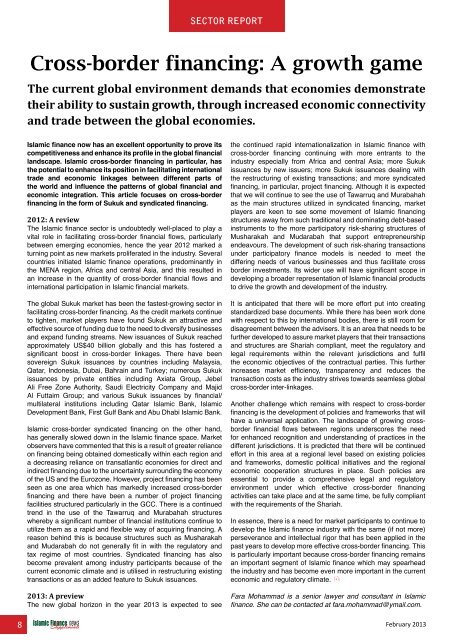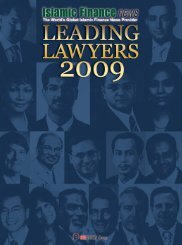View PDF Edition - Islamic Finance News
View PDF Edition - Islamic Finance News
View PDF Edition - Islamic Finance News
You also want an ePaper? Increase the reach of your titles
YUMPU automatically turns print PDFs into web optimized ePapers that Google loves.
sector report<br />
Cross-border financing: A growth game<br />
The current global environment demands that economies demonstrate<br />
their ability to sustain growth, through increased economic connectivity<br />
and trade between the global economies.<br />
<strong>Islamic</strong> finance now has an excellent opportunity to prove its<br />
competitiveness and enhance its profile in the global financial<br />
landscape. <strong>Islamic</strong> cross-border financing in particular, has<br />
the potential to enhance its position in facilitating international<br />
trade and economic linkages between different parts of<br />
the world and influence the patterns of global financial and<br />
economic integration. This article focuses on cross-border<br />
financing in the form of Sukuk and syndicated financing.<br />
2012: A review<br />
The <strong>Islamic</strong> finance sector is undoubtedly well-placed to play a<br />
vital role in facilitating cross-border financial flows, particularly<br />
between emerging economies, hence the year 2012 marked a<br />
turning point as new markets proliferated in the industry. Several<br />
countries initiated <strong>Islamic</strong> finance operations, predominantly in<br />
the MENA region, Africa and central Asia, and this resulted in<br />
an increase in the quantity of cross-border financial flows and<br />
international participation in <strong>Islamic</strong> financial markets.<br />
The global Sukuk market has been the fastest-growing sector in<br />
facilitating cross-border financing. As the credit markets continue<br />
to tighten, market players have found Sukuk an attractive and<br />
effective source of funding due to the need to diversify businesses<br />
and expand funding streams. New issuances of Sukuk reached<br />
approximately US$40 billion globally and this has fostered a<br />
significant boost in cross-border linkages. There have been<br />
sovereign Sukuk issuances by countries including Malaysia,<br />
Qatar, Indonesia, Dubai, Bahrain and Turkey; numerous Sukuk<br />
issuances by private entities including Axiata Group, Jebel<br />
Ali Free Zone Authority, Saudi Electricity Company and Majid<br />
Al Futtaim Group; and various Sukuk issuances by financial/<br />
multilateral institutions including Qatar <strong>Islamic</strong> Bank, <strong>Islamic</strong><br />
Development Bank, First Gulf Bank and Abu Dhabi <strong>Islamic</strong> Bank.<br />
<strong>Islamic</strong> cross-border syndicated financing on the other hand,<br />
has generally slowed down in the <strong>Islamic</strong> finance space. Market<br />
observers have commented that this is a result of greater reliance<br />
on financing being obtained domestically within each region and<br />
a decreasing reliance on transatlantic economies for direct and<br />
indirect financing due to the uncertainty surrounding the economy<br />
of the US and the Eurozone. However, project financing has been<br />
seen as one area which has markedly increased cross-border<br />
financing and there have been a number of project financing<br />
facilities structured particularly in the GCC. There is a continued<br />
trend in the use of the Tawarruq and Murabahah structures<br />
whereby a significant number of financial institutions continue to<br />
utilize them as a rapid and flexible way of acquiring financing. A<br />
reason behind this is because structures such as Musharakah<br />
and Mudarabah do not generally fit in with the regulatory and<br />
tax regime of most countries. Syndicated financing has also<br />
become prevalent among industry participants because of the<br />
current economic climate and is utilised in restructuring existing<br />
transactions or as an added feature to Sukuk issuances.<br />
2013: A preview<br />
The new global horizon in the year 2013 is expected to see<br />
the continued rapid internationalization in <strong>Islamic</strong> finance with<br />
cross-border financing continuing with more entrants to the<br />
industry especially from Africa and central Asia; more Sukuk<br />
issuances by new issuers; more Sukuk issuances dealing with<br />
the restructuring of existing transactions; and more syndicated<br />
financing, in particular, project financing. Although it is expected<br />
that we will continue to see the use of Tawarruq and Murabahah<br />
as the main structures utilized in syndicated financing, market<br />
players are keen to see some movement of <strong>Islamic</strong> financing<br />
structures away from such traditional and dominating debt-based<br />
instruments to the more participatory risk-sharing structures of<br />
Musharakah and Mudarabah that support entrepreneurship<br />
endeavours. The development of such risk-sharing transactions<br />
under participatory finance models is needed to meet the<br />
differing needs of various businesses and thus facilitate cross<br />
border investments. Its wider use will have significant scope in<br />
developing a broader representation of <strong>Islamic</strong> financial products<br />
to drive the growth and development of the industry.<br />
It is anticipated that there will be more effort put into creating<br />
standardized base documents. While there has been work done<br />
with respect to this by international bodies, there is still room for<br />
disagreement between the advisers. It is an area that needs to be<br />
further developed to assure market players that their transactions<br />
and structures are Shariah compliant, meet the regulatory and<br />
legal requirements within the relevant jurisdictions and fulfil<br />
the economic objectives of the contractual parties. This further<br />
increases market efficiency, transparency and reduces the<br />
transaction costs as the industry strives towards seamless global<br />
cross-border inter-linkages.<br />
Another challenge which remains with respect to cross-border<br />
financing is the development of policies and frameworks that will<br />
have a universal application. The landscape of growing crossborder<br />
financial flows between regions underscores the need<br />
for enhanced recognition and understanding of practices in the<br />
different jurisdictions. It is predicted that there will be continued<br />
effort in this area at a regional level based on existing policies<br />
and frameworks, domestic political initiatives and the regional<br />
economic cooperation structures in place. Such policies are<br />
essential to provide a comprehensive legal and regulatory<br />
environment under which effective cross-border financing<br />
activities can take place and at the same time, be fully compliant<br />
with the requirements of the Shariah.<br />
In essence, there is a need for market participants to continue to<br />
develop the <strong>Islamic</strong> finance industry with the same (if not more)<br />
perseverance and intellectual rigor that has been applied in the<br />
past years to develop more effective cross-border financing. This<br />
is particularly important because cross-border financing remains<br />
an important segment of <strong>Islamic</strong> finance which may spearhead<br />
the industry and has become even more important in the current<br />
consulting www.<strong>Islamic</strong><strong>Finance</strong>Consulting.com<br />
www.<strong>Islamic</strong><strong>Finance</strong>Events.com<br />
economic and regulatory climate.<br />
www.<strong>Islamic</strong><strong>Finance</strong><strong>News</strong>.com<br />
www.<strong>Islamic</strong><strong>Finance</strong>Training.com<br />
www.MIFforum.com<br />
www.MIFmonthly.com<br />
www.MIFtraining.com<br />
www.REDmoneyBooks.com<br />
Fara Mohammad is a senior lawyer and consultant in <strong>Islamic</strong><br />
finance. She can be contacted at fara.mohammad@ymail.com.<br />
8 February 2013
















